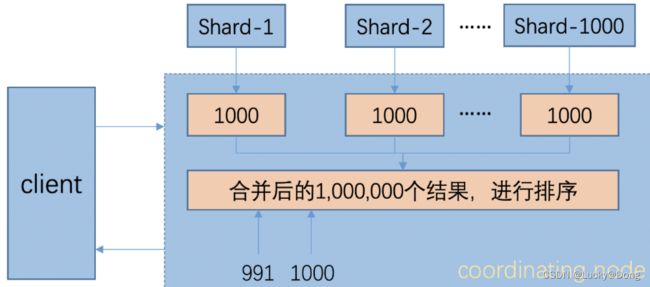【ElasticSearch】结果集过大查询报错;扩大max_result_window配置;查询对比:from...size查询、search_after查询、scroll查询
一、ES查询报错:
查询中,使用了from、size的方案进行轮训查询,结果在from + size > 10000时报错:
报错1:
get tid once, from:0, size:100
get tid once, from:100, size:100
......
get tid once, from:9900, size:100
get tid once, from:10000, size:100get need modify tid fail: es query fail:elastic: Error 500 (Internal Server Error): all shards failed [type=search_phase_execution_exception]
报错2:
elasticsearch.exceptions.TransportError: TransportError(500, 'search_phase_execution_exception', 'Result window is too large, from + size must be less than or equal to ....
二、解决办法:
在创建索引的时候添加:
mappings = {
"mappings": {
"numerical_keyword": {
"properties": {
"search_keyword": { # 搜索关键词
"type": "text",
"index": "true"
}
}
}
},
"settings": {
"index": {
"max_result_window": 500000 # 修改这里的数量限制,可以自己定义
}
}
}
三、报错问题进一步分析
测试:
GET media_std_content_dispatch/_search
{
"from": 10000,
"size": 10
}
应答:
{
"error":{
"root_cause":[
{
"type":"query_phase_execution_exception",
"reason":"Result window is too large, from + size must be less than or equal to: [10000] but was [10010]. See the scroll api for a more efficient way to request large data sets. This limit can be set by changing the [index.max_result_window] index level setting."
}
],
"type":"search_phase_execution_exception",
"reason":"all shards failed",
"phase":"query",
"grouped":true,
"failed_shards":[
{
"shard":0,
"index":"media_std_content_dispatch",
"node":"UMQ0-vTxRQiXkR4vu8iyoQ",
"reason":{
"type":"query_phase_execution_exception",
"reason":"Result window is too large, from + size must be less than or equal to: [10000] but was [10010]. See the scroll api for a more efficient way to request large data sets. This limit can be set by changing the [index.max_result_window] index level setting."
}
}
]
},
"status":500
}
查看了源码,发现from、size的方式在from + size > maxResultWindow时会报错,具体参考:
server/src/main/java/org/elasticsearch/search/DefaultSearchContext.java
/**
* Should be called before executing the main query and after all other parameters have been set.
*/
@Override
public void preProcess() {
if (hasOnlySuggest()) {
return;
}
long from = from() == -1 ? 0 : from();
long size = size() == -1 ? 10 : size();
long resultWindow = from + size;
int maxResultWindow = indexService.getIndexSettings().getMaxResultWindow();
if (resultWindow > maxResultWindow) {
if (scrollContext() == null) {
throw new IllegalArgumentException(
"Result window is too large, from + size must be less than or equal to: ["
+ maxResultWindow
+ "] but was ["
+ resultWindow
+ "]. See the scroll api for a more efficient way to request large data sets. "
+ "This limit can be set by changing the ["
+ IndexSettings.MAX_RESULT_WINDOW_SETTING.getKey()
+ "] index level setting."
);
}
......
}
......
}
其他解决办法
1、扩大max_result_window
把max_result_window扩大到比结果集还大,就能用from、size的方式循环取结果,或者用普通查询方式一次把结果取出来。
from、size的方式是从每个shard上先取from + size条数据,然后发送到请求节点上,请求节点进行合并排序,取出需要的部分;例如1000个shard,from = 990,size = 10,那么每个shard就要取1000条数据,总共100万条数据发送到请求节点,请求节点对这100万条数据进行排序,然后取出排序后的991 - 1000共10条数据;这种操作在带宽、计算性能和存储等方面都有很大的浪费,非常不建议这种做法。
下面是这种方式的大概流程:
2、search_after方式
search_after是指定按一些字段排序,逐步往后走,可以类比mysql的order by limit操作:
1、select fields from table order by id asc limit 10;
记录下最后一条数据的id:last_id,用作下面的比较条件
2、select fields from table where id > last_id order by id asc limit 10;
记录下最后一条数据的id:last_id,用作后续的比较条件,循环步骤2
注意:
这种方法有个地方要注意,它是按sort field的顺序往后找,假设开始数据中age = 1、3、5、7,当使用search_after方式查到age = 5时,插入了一条age = 2的数据,search_after这种方式是搜索不到新插入的数据,因为要搜索的是age > 5的数据,新数据不满足。
3、scroll方式
scroll方式首先对查询结果生成快照,后续的操作都是针对这个快照进行的;因为是当时的快照,新数据不会包含在内,所以不能用于实时的操作。
scroll方式只需要知道这个快照的id,叫scroll_id,就能循环获取后续数据
// 第一次请求,指定是 scroll 方式
GET test_index/_search?scroll=1m
{
"size": 2
}
// 应答信息
{
"_scroll_id":"DXF1ZXJ5QW5kRmV0Y2gBAAAAAQEPczgWVU1RMC12VHhSUWlYa1I0dnU4aXlvUQ==",
"hits":{
"total":7,
"hits":[
{
"_source":{
"name":"a",
"age":1
}
},
{
"_source":{
"name":"b",
"age":2
}
}
]
}
}
// 后续请求
GET /_search/scroll
{
"scroll" : "1m",
"scroll_id" : "DXF1ZXJ5QW5kRmV0Y2gBAAAAAQEPczgWVU1RMC12VHhSUWlYa1I0dnU4aXlvUQ=="
}
// 后续应答
{
"_scroll_id":"DXF1ZXJ5QW5kRmV0Y2gBAAAAAQEPczgWVU1RMC12VHhSUWlYa1I0dnU4aXlvUQ==",
"hits":{
"total":7,
"hits":[
{
"_source":{
"name":"c",
"age":3
}
},
{
"_source":{
"name":"d",
"age":4
}
}
]
}
}
我们只需要知道第一次请求产生的快照id:_scroll_id = DXF1ZXJ5QW5kRmV0Y2gBAAAAAQEPczgWVU1RMC12VHhSUWlYa1I0dnU4aXlvUQ==,后续的请求都拿这个_scroll_id继续从这个快照里拿后续数据,个人猜测每个scroll快照里应该有个offset之类的信息,这样才能不断往后取数据。
“GET test_index/_search?scroll=1m”请求中的scroll=1m表示这个scroll快照要保留1 minute,相当于快照的ttl,后面每次请求中的"scroll" : "1m"也是这个意思,表示再次设置该快照的ttl为1 minute;如果知道后续数据处理的越来越慢,可以逐渐调大这个scroll的保留时间,避免快照被超时销毁。
四、结论
from、size的方式获取数据量不能超过max_result_window,也不建议调大这个参数,从效果和性能上看,scroll方式是获取大结果集的合适方式。
